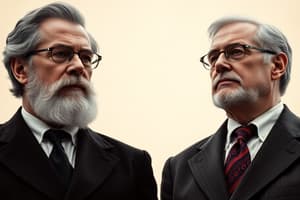Podcast
Questions and Answers
What is Classical Conservatism?
What is Classical Conservatism?
- Emphasis on equality
- Complete government control
- Maintaining existing or traditional order (correct)
- Support for radical change
What does Classical Conservatism consist of?
What does Classical Conservatism consist of?
A mixed view of human nature, society as an organic whole, hierarchy, and the importance of stability, law, and traditions.
Who played a key role in the development of Classical Conservatism?
Who played a key role in the development of Classical Conservatism?
Edmund Burke
What does Classical Conservative ideology emphasize?
What does Classical Conservative ideology emphasize?
The belief that society equals more than the sum of its parts is characteristic of Classical Conservatism.
The belief that society equals more than the sum of its parts is characteristic of Classical Conservatism.
A Classical Conservative would be more comfortable with a trend toward concentration of political power than a _______.
A Classical Conservative would be more comfortable with a trend toward concentration of political power than a _______.
Why did Classical Conservatism begin?
Why did Classical Conservatism begin?
Who observed the early stages of the French Revolution and predicted violence?
Who observed the early stages of the French Revolution and predicted violence?
Why did Burke and other conservatives attack Liberalism?
Why did Burke and other conservatives attack Liberalism?
What four concepts does Classical Conservatism emphasize?
What four concepts does Classical Conservatism emphasize?
How does Classical Conservatism view stability?
How does Classical Conservatism view stability?
What is the Classical Conservative view on concreteness?
What is the Classical Conservative view on concreteness?
What does Classical Conservatism say about human fallibility?
What does Classical Conservatism say about human fallibility?
What is the stance of Classical Conservatism on unique circumstances?
What is the stance of Classical Conservatism on unique circumstances?
Flashcards are hidden until you start studying
Study Notes
Classical Conservatism Overview
- Classical Conservatism emphasizes maintaining traditional social orders and political structures.
- Prioritizes respect for institutions, skepticism towards government intervention, and a cautious approach to change.
Key Concepts of Classical Conservatism
- Human nature is seen as mixed; self-interest can lead to harm.
- Society is viewed as an organic entity, with hierarchy rather than equality being central.
- Elites are granted ruling rights but are obligated to ensure societal welfare ("noblesse oblige").
- Stability, law, order, customs, and traditions are deemed essential for a functioning society.
- Advocates for limited citizenship rights and a mixed economic approach.
Intellectual Foundations
- Edmund Burke is considered a pivotal figure in Classical Conservatism, reflecting on moral natural law and Western traditions.
- Burke's political reasoning relies on "ordered liberty," rooted in established institutions like the church and family.
- Criticized the French Revolution for its radicalism, warning against the dangers of abstract rights in his work "Reflections on the Revolution in France."
Ideological Emphasis
- Promotes the idea that society transcends individual interests, representing a collective whole.
- Classical Conservatives are generally more accepting of centralized political power compared to Classical Liberals.
Historical Context
- Emerged as a response to liberal ideologies during the French Revolution of the late 18th century.
- Burke expressed alarm at the early revolution stages, foreseeing ensuing violence and chaos.
Critique of Liberalism
- Conservatives contend that liberalism undermines traditions and institutions in favor of new ideas and capitalism.
- Fears of societal chaos due to rapid change align with conservative beliefs in gradual reform.
Core Principles of Classical Conservatism
- Stability: Change should be gradual, as instability can lead to societal breakdown.
- Concreteness: Critique of liberalism’s abstract ideals of freedom and equality without considering real-life contexts.
- Human Fallibility: Acknowledges human ignorance and irrationality, arguing that liberalism overlooks these traits.
- Unique Circumstances: Beliefs that solutions to societal issues must consider specific national circumstances rather than universal truths.
Burke's Views on Democracy
- Specific insights on democracy were offered by Burke but not detailed; he maintained a cautious and nuanced stance on democratic principles while respecting established hierarchies.
Studying That Suits You
Use AI to generate personalized quizzes and flashcards to suit your learning preferences.




